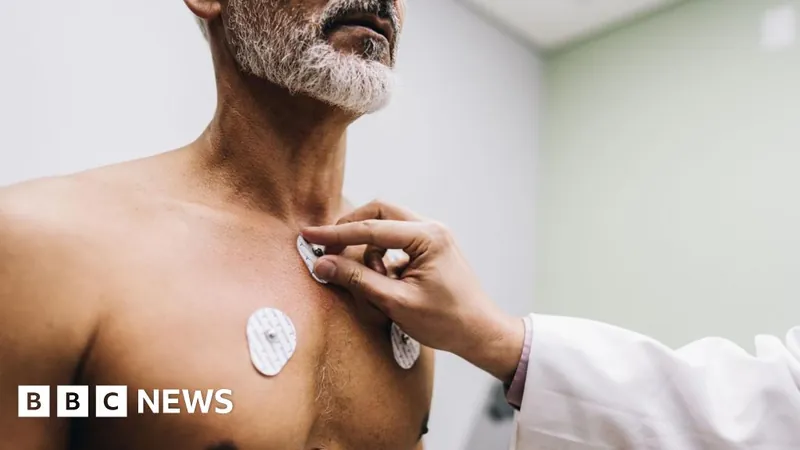
Revolutionary AI Technology Set to Transform Type 2 Diabetes Detection in UK Hospitals
2024-12-24
Author: Ting
Introduction
In a groundbreaking initiative, two NHS hospital trusts in London—Imperial College and Chelsea and Westminster—are trialing an innovative AI system named Aire-DM. This technology aims to identify patients at risk of developing type 2 diabetes up to ten years before the condition manifests. This early detection could be a significant game-changer in managing the growing diabetes crisis.
How Aire-DM Works
Aire-DM analyzes patients' electrocardiogram (ECG) heart traces, focusing on nuanced early warning signs that even the most skilled doctors often overlook. Early studies indicate that the AI can accurately spot potential diabetes risk about 70% of the time. According to lead researcher Dr. Fu Siong Ng, enhancing the AI's capabilities by inputting additional patient information such as age, sex, existing high blood pressure, and weight further boosts its predictive power.
Expert Insights
Dr. Ng emphasized the complexity of the ECG changes the system identifies: "It’s not as straightforward as pointing out a specific part of the ECG; it involves analyzing a combination of subtle indicators." In the upcoming trials, around 1,000 patients will undergo ECG scans assessed by the AI to observe its effectiveness in predicting diabetes risk.
Future Rollout and Support
While the technology is not ready for routine use yet, experts foresee a broader rollout on the NHS potentially taking five years or longer. This advancement comes as the British Heart Foundation backs the research, highlighting that early identification of diabetes risk can be life-saving. Unmanaged type 2 diabetes significantly raises the chances of severe health complications, including heart attacks and strokes.
Importance of Lifestyle
Maintaining a healthy lifestyle remains crucial in battling diabetes. Weight management, a balanced diet, and regular exercise are essential in staving off complications linked with the condition.
Professional Perspectives
Professor Bryan Williams, Chief Scientific and Medical Officer at the British Heart Foundation, described the research as exciting and transformative. He noted that AI-driven analysis of ECGs could reveal indicators not typically seen in standard health data collection, paving the way for proactive health management in populations at risk.
Urgency of the Initiative
Dr. Faye Riley from Diabetes UK underlined the urgency of this initiative, pointing out that type 2 diabetes often goes unnoticed for years. She noted that about 1.2 million individuals in England are unaware they're living with diabetes, with many more at high risk. Identifying these individuals early through advanced AI screening methods could provide critical interventions to prevent severe complications such as heart failure and sight loss.
What is Type 2 Diabetes?
Type 2 diabetes is a prevalent health issue characterized by elevated sugar (glucose) levels in the blood. This condition arises when the body cannot produce enough insulin or effectively use the insulin it produces. A significant contributor to type 2 diabetes is excess weight, which can lead to fat accumulation around the pancreas— the organ responsible for insulin production.
In contrast, type 1 diabetes is an autoimmune condition that requires a fundamentally different treatment approach.
Conclusion
In summary, the pioneering work of the NHS trusts utilizing AI technology represents a vital step toward early detection and intervention for type 2 diabetes, potentially reshaping how we approach this critical public health challenge. If successful, the implications for patient health and the healthcare system could be monumental. Stay tuned for results from the clinical trials set to begin in 2025!

 Brasil (PT)
Brasil (PT)
 Canada (EN)
Canada (EN)
 Chile (ES)
Chile (ES)
 España (ES)
España (ES)
 France (FR)
France (FR)
 Hong Kong (EN)
Hong Kong (EN)
 Italia (IT)
Italia (IT)
 日本 (JA)
日本 (JA)
 Magyarország (HU)
Magyarország (HU)
 Norge (NO)
Norge (NO)
 Polska (PL)
Polska (PL)
 Schweiz (DE)
Schweiz (DE)
 Singapore (EN)
Singapore (EN)
 Sverige (SV)
Sverige (SV)
 Suomi (FI)
Suomi (FI)
 Türkiye (TR)
Türkiye (TR)